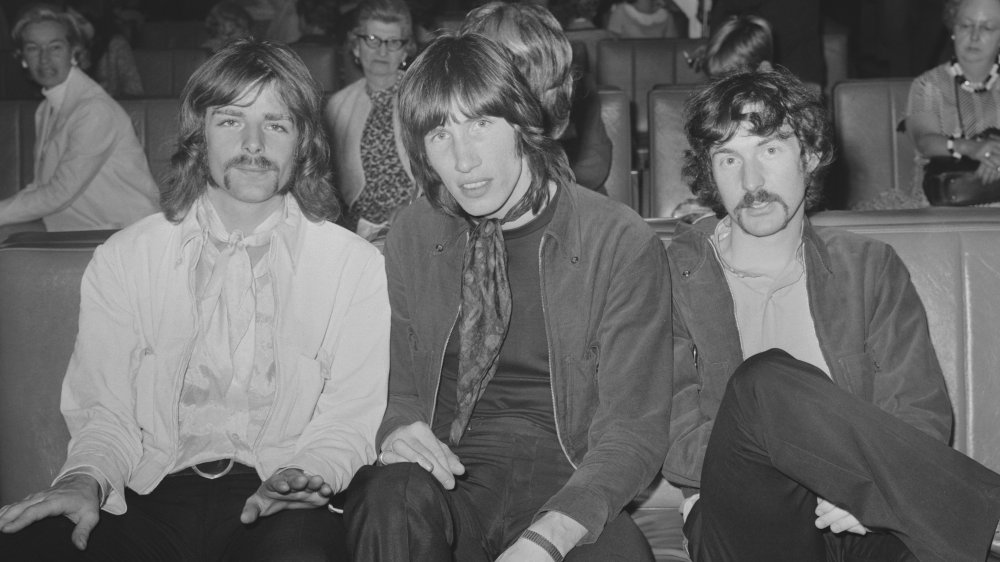The Real Reason Roger Waters Left Pink Floyd
Ever heard of an English rock band called The Megadeaths? (Not to be confused with Megadeth. At all.) How about The Spectrum 5? Not ringing a bell? Try The Screaming Abdabs, later simplified to just The Abdabs, which is better, but perhaps not great. No wonder they switched to The Tea Set.
According to Cheat Sheet, that ended up being problematic, too — just as Jerry Garcia and friends discovered their chosen band name, The Warlocks, was already in use by another group, motivating the change to The Grateful Dead — so it was with The Tea Set, who found themselves on the bill for a 1965 show with another band named, coincidentally enough, The Tea Set.
Syd Barrett, guitarist for the specific band known as The Tea Set which concerns us at the moment, seems to have been one of those artsy kids early on. Biography tells us that he discovered music as a child — he was the fourth of five — and played banjo, ukulele, and piano, in addition to guitar, as a youngster. He also drew and wrote, and won school awards for his poetry output. Clearly he was the right man at the right time to solve the naming conundrum facing The Tea Set.
They used to be known as The Tea Set, among other things
Barrett is credited with combining names from two of his favorite bluesmen, Pinkney "Pink" Anderson and Floyd Council, and then adding "Sound," to create "The Pink Floyd Sound." Nobody probably recognized it at the time, but pop music history was being made.
After the gig they went back to their old Tea Set designation, but eventually came back around and saw the light, so to speak. The name, minus "Sound," stuck, with bassist Roger Waters, organist Richard Wright, and drummer Nick Mason hitting the English pop charts two years later with a single, "Arnold Layne." (Not to be confused with another English group and "Penny Lane.")
It almost didn't happen at all. Barrett had chucked his teenage music aspirations for a time to study art in London. There he reconnected with an old school chum, Roger Waters, who was performing. Syd joined up, personnel changed, band names changed, and 1965 saw them make their first studio recordings: three Beatles covers and three of Barrett's original composition. The year 1965 was historic for Pink Floyd, not just for recording, but because that was when the first real cracks in the band's cohesion began to appear.
Roger Waters left, and then came lawyers
That was the year that Barrett, in those days the main songwriter, discovered LSD. Plenty of rockers in those days indulged in psychedelics for image, recreation, and inspiration (and probably still do). Pink Floyd's debut album, The Piper at the Gates of Dawn, was a hit, but the drugs quickly became an issue.
Some claim the LSD he was taking caused a psychotic break. What is certain is that Barrett was spiraling out of control. During one show, he detuned his guitar while on stage; for another, he strummed one chord all night, except for those moments when he didn't play at all. David Gilmour filled in for, and eventually replaced, Barrett, who was officially out of Pink Floyd by 1968.
Problem solved, right? Not really. The band enjoyed increasing success over the years after Barrett, but with great success comes — great ego, maybe. Rolling Stone reported in 2013 that Waters broke from the group in 1985 to establish a solo career after the release of 1983's The Final Cut. As far as he was concerned, the band was done.
"Elderly gentlemen at loggerheads"
His fellow members, however, begged to disagree. Waters sued in 1986 to prevent remaining members Gilmour and Mason from recording or performing as Pink Floyd. Waters told the BBC, "I was wrong" to sue them. Leaving the band wasn't wrong, however. Waters termed the decision "the right thing to do" so that "I could express my ideas unfettered." As for the suit: after two years of litigation, it was settled out of court.
It didn't end the bickering, of course. Nick Mason is Pink Floyd's long-time drummer, the only member of the band to play on each and every one of the albums and, the story is told, the only member who always opposed breaking up. In 2018 Mason told Rolling Stone, "It's a really odd thing in my opinion. I think the problem is Roger doesn't really respect David. He feels that writing is everything, and that guitar playing and the singing are something that, I won't say anyone can do, but that everything should be judged on the writing rather than the playing.
"I actually get along with both of them," he told reporter Andy Greene. "I think it's really disappointing that these rather elderly gentlemen are still at loggerheads."



